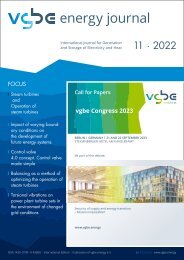VGB POWERTECH 11 (2019)
VGB PowerTech - International Journal for Generation and Storage of Electricity and Heat. Issue 11 (2019). Technical Journal of the VGB PowerTech Association. Energy is us! Power plant operation: legal & technology. Pumped hydro storage. Latent heat storages.
VGB PowerTech - International Journal for Generation and Storage of Electricity and Heat. Issue 11 (2019).
Technical Journal of the VGB PowerTech Association. Energy is us!
Power plant operation: legal & technology. Pumped hydro storage. Latent heat storages.
Create successful ePaper yourself
Turn your PDF publications into a flip-book with our unique Google optimized e-Paper software.
<strong>VGB</strong> PowerTech <strong>11</strong> l <strong>2019</strong><br />
<strong>VGB</strong>-Book<br />
Failures and Forced Unavailability of Power Plants<br />
Henk C. Wels<br />
<strong>VGB</strong>-B 035 | <strong>2019</strong><br />
DIN B5, 276 pages, price: 48.– €, + VAT and postage<br />
Failures and<br />
Forced Unavailability<br />
of Power Plants<br />
Henk C. Wels<br />
<strong>VGB</strong>-B 035<br />
Power plants are not functioning to the fullest 100 % of the time. Maintenance and inspection of some components<br />
require them to be off-line in time, however, this can be planned such that customers continue receiving power from<br />
the electrical grid, steam or district heating from other plants. Unplanned outages due to failures or external conditions<br />
may cause surprises and can lead to situations in which the demand is not satisfied at short term at large costs.<br />
When plants are similar in size or when feasible given the number of plants, the N-1 principle can be followed. The<br />
electrical grid operator has contracted a plant in hot standby or makes the plants in operation to set their power by<br />
an amount of spare sufficient to remedy loss of a plant and that can be controlled up or down to keep the frequency<br />
constant and the total demand being met. When a large number of plants are meeting the demand, a reserve factor<br />
>1 can be applied depending on economical boundary conditions and/or grid connections with abroad.<br />
When demand is not met, the grid operator has to lower this demand by curtailing load to make sure that generators<br />
protection systems do not switch off so many generators that due to a domino effect a blackout occurs with<br />
large parts of the grid without power. Therefore, forced unavailability results in additional installed power that takes<br />
time to realize and it is costly. Unavailability, planned or forced, results for the owner of the plant in fixed costs<br />
(capital, maintenance, personnel) that are not compensated by income from MWhrs produced if no margin would<br />
be added to income.<br />
Given this relevance, unavailability must be minimized, however, not at all costs. For reserve units that operate only<br />
a few hours per year it does not pay to repair around the clock resulting in minimum forced unavailability.<br />
The overall costs must be minimized at maximum production income within market and regulatory constraints.<br />
In this book unavailability is modeled both qualitatively and quantitatively. Without modeling, (describing how<br />
power plants seem to react on the factors that define unavailability) one cannot optimize. With modeling comes the<br />
ability to forecast unavailability as a factor of influence factors such as operation hours, starts, plant layout. Models<br />
for human decision making are not discussed, only the effects of this decision making are studied.<br />
The book is derived from earlier papers presented at ESREDA, PGMON, <strong>VGB</strong> Working Groups and other committees<br />
while working with KEMA and its legacy companies and departments NRG, DNV-GL and DEKRA. The consent of<br />
representatives of these organizations and firms for copying and further publishing has been granted. The names of<br />
power plants still operating have been omitted or made anonymous. A description of the work of ESREDA is given.<br />
<strong>VGB</strong> PowerTech Service GmbH Deilbachtal 173 | 45257 Essen | P.O. Box 10 39 32 | Germany<br />
Verlag technisch-wissenschaftlicher Schriften | Fon: +49 201 8128-200 | Fax: +49 201 8128-302<br />
mark@vgb.org | www.vgb.org/shop<br />
Stay in contact with us! Newsletter subscription www.vgb.org/en/newsletter.html<br />
90


















